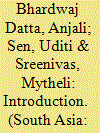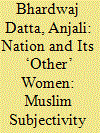| Srl | Item |
| 1 |
ID:
178861


|
|
|
|
|
| Summary/Abstract |
This Introduction frames a collection of papers that explore the roles played by women—as volunteers, organisers, bureaucrats, politicians and citizens—in shaping the emerging ideologies and structures of independent India. Although women’s participation is both understudied and inadequately theorised in existing scholarship, the papers in this collection demonstrate that the decades following India’s Independence witnessed the participation of women in every sphere of politics and nation-building. The introductory essay tracks the limits and possibilities of women’s agency and gendered citizenship in these spheres to historicise the women’s movement during the post-Independence decades, and to examine its fraught relationship with feminism, patriarchal society and state politics.
|
|
|
|
|
|
|
|
|
|
|
|
|
|
|
|
| 2 |
ID:
178871


|
|
|
|
|
| Summary/Abstract |
Partition produced newer anxieties for Delhi’s Muslims as they became subject to the everyday violence of both state and society, exacerbated by the rise of Hindu nationalism and the organised demarcation of Muslim-dominated areas as ‘exclusionary’ and ‘contested’ zones. While the city was fraught with violent conflicts and exclusionary politics, gender was also being redefined and renegotiated. This article will query the particular lived experience and embodied agency of Muslim women in order to study gender and space within the context of social, cultural, economic and political changes after Partition. It will explore the ways in which women exercised agency and claimed space and belonging in everyday negotiations and strategies for survival, thereby contributing to family income and small capitalism in the Old City. It will study their diverse experiences which were shaped by their social location and challenged by the political, religious, economic and social processes that impinged upon their lives. Rather than seeing them as passive subjects of history, it foregrounds Muslim women’s navigation of state, community and the household in independent India.
|
|
|
|
|
|
|
|
|
|
|
|
|
|
|
|